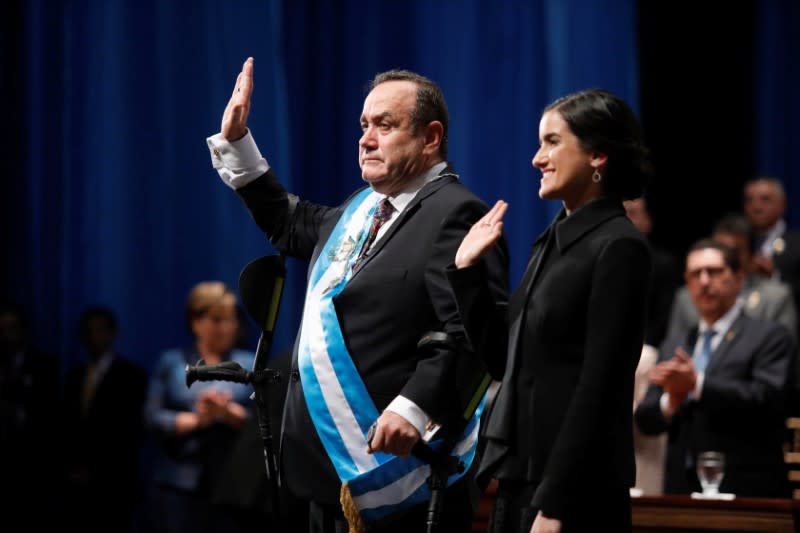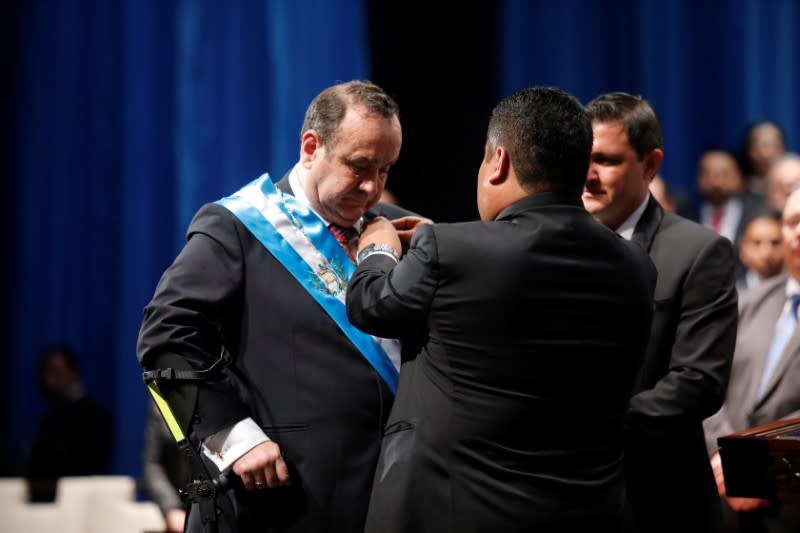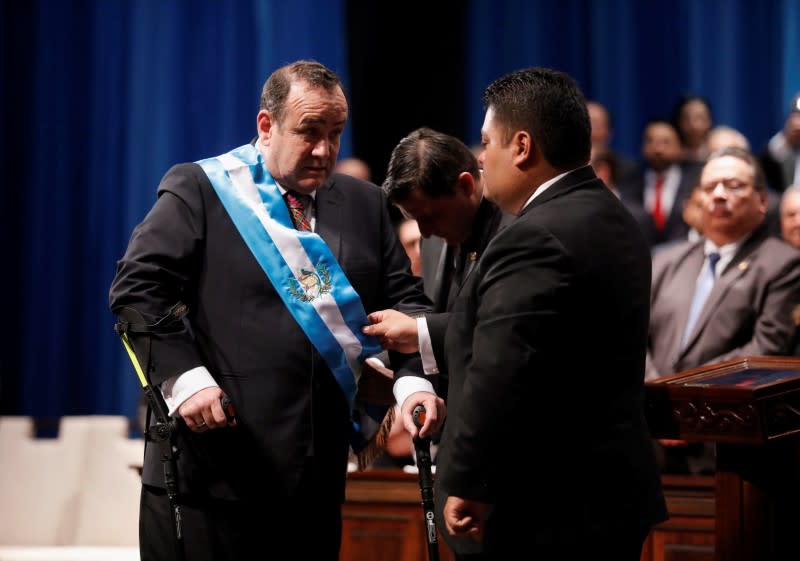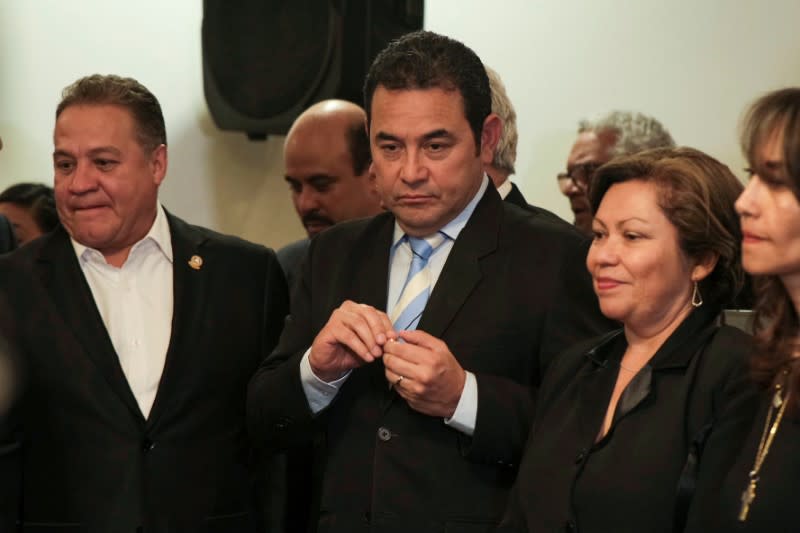Turbulent inauguration day in Guatemala, outgoing president hit by eggs
By Sofia Menchu and Frank Jack Daniel
GUATEMALA CITY (Reuters) - Guatemalan President Alejandro Giammattei took office on Tuesday in a ceremony overshadowed by delays and protests against outgoing officials seeking immunity from prosecution, a reminder of the country's deep-seated political corruption.
The 63-year-old Giammattei, a former surgeon and ex-prison chief, apologized on Twitter to guests and Guatemalans for the five-hour wait beyond the scheduled time.
Giammattei, who won the top office on his fourth attempt and uses crutches because of multiple sclerosis, took to the stage to a Spanish version of Frank Sinatra's "My Way." He said change had begun in Central America's most populous nation.
Because of the delays, the head of the U.S. delegation, Commerce Secretary Wilbur Ross, left for a flight back to Washington before the ceremony started, as did Homeland Security acting Secretary Chad Wolf. Earlier they met Giammattei to discuss immigration.
The new president took a hard line in the inaugural speech on crime and corruption that he said had kept Guatemala poor.
"Today, we are putting a full stop on corrupt practices so they disappear from the face of this country," Giammattei said, saying he would investigate recent graft, in what could be a seen as a warning to the previous administration.
However, Giammattei's strategy to uproot corruption from political life will be closely watched after his predecessor, fellow conservative Jimmy Morales, chased out a U.N.-backed anti-corruption body investigating him and his family.
Most right-of center politicians, including Giammattei, came to see the corruption body, known as CICIG, as an unacceptable violation on Guatemala's sovereignty. Giammattei said he will quickly create a anti-corruption force tied to the president's office instead.
Hours after his term ended, Morales was roughly treated by protesters and hit by eggs and a plastic projectile as he tried to take up a seat in a regional parliament that would offer him some protection from prosecution.
With the help of riot police, he and his former vice-president were able to take their oaths of office. Morales had immunity as president. He has been investigated for campaign finance violations, which he denies.
Earlier, jostling in Congress, where new and returning lawmakers were also sworn in on Tuesday, appeared to have slowed down the day's proceedings. One politician recovering from an operation arrived late in a wheelchair and was carried out on a stretcher.
The politician, Herber Melgar Padilla, is under investigation for money laundering, which he denies. He could have lost his immunity from prosecution if he did not take his oath on Tuesday. His vote was also important to help conservative parties retain control of the house leadership.
TERRORISTS AND GUNS
In his speech, Giammattei encouraged police to use their guns against criminals when needed, saying the government would defend them if they protected citizens, a message likely to worry rights groups in a country with a history of extra-judicial killings.
Guatemala's murder rate has halved in the past 10 years, a result credited to the professionalization of the civil police force.
"There is no peace without security," Giammattei said, outlining a plan to designate some criminals terrorists.
"I will present a law that aims to declare street gangs for what they are - terrorist groups," he said.
He brandished a bill he said would make it easier to prosecute gangs, which in Guatemala include the MS-13 and Barrio 18 transnational "maras" formed in Los Angeles and Central America.
Giammattei was in 2013 cleared of charges he was involved in illegal deaths of prison gang leaders while he headed the penitentiary system. He was briefly jailed himself.
Giammattei was not initially favorite to win the election, but prospered after electoral authorities excluded key candidates from the race.
ROLL BACK OR EXPAND
Despite his focus in public on crime, high on Giammattei's to-do list is a decision on whether to roll back or expand an agreement with the United States forged by Morales that makes Guatemala a buffer zone to reduce U.S. asylum claims.
The agreement, brokered last July, allows U.S. immigration officials to send migrants requesting asylum at the U.S.-Mexican border to apply for protection in Guatemala instead.
Currently, the United States sends Hondurans and Salvadorans seeking asylum at the U.S.-Mexico border to Guatemala to ask for refuge there. Washington wants to expand the deal to include Mexicans as well.
The U.S. embassy said Wolf talked to Giammattei about curbing illegal migration and improving border security, and that the U.S. International Development Finance Corp would sign a memorandum of understanding on Wednesday with Guatemala to spur $1 billion in private-sector investment and create jobs.
In steps likely to please the Trump administration, Giammattei signaled he would keep his country's embassy in Israel in Jerusalem and plans to designate Iran-backed Lebanese Shi'ite group Hezbollah as a terrorist organization.
Guatemala is one of Latin America's poorest and most unequal nations, with poverty rising since 2000 despite strong economic growth, according to the World Bank. U.S. officials have threatened it with economic consequences if it does not accept the Asylum Cooperation Agreement.
(Reporting by Sofia Menchu; Additional reporting by Jeff Abbott in Guatemala City and Daina Beth Solomon in Mexico City; Editing by Frank Jack Daniel, Leslie Adler and Raju Gopalakrishnan)














